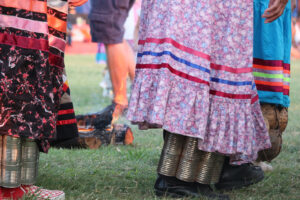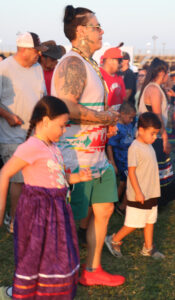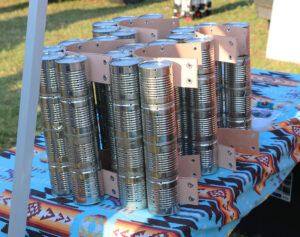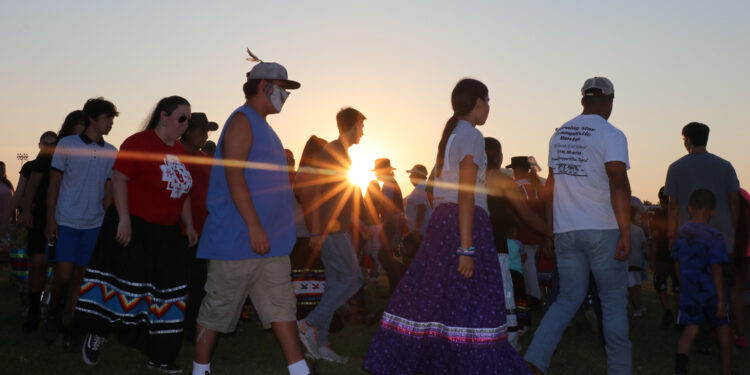OKMULGEE, Oklahoma – Muscogee citizens were excited to be able to gather for the Muscogee Festival Stompdance on June 23 finally. It had been three years since the last fire was lit on the Claude Cox Omniplex grounds for the annual demonstration Stompdance.
The tribe canceled the event in 2020 and 2021 due to the COVID-19 pandemic to protect the most vulnerable.
Not everyone made it out of the pandemic as it delivered a significant blow to tribal communities, including the devastating loss of David Proctor. According to Tourism Event Coordinator Ryan Logan, Proctor led the demonstration dance that opened the festival for 12 years.
Logan was unsure where to turn. But as is often the case, the event called forward multiple people to lead, including Principal Chief David Hill.
Although this was not his first dance, it was his first Festival Stompdance as Chief.
“I don’t know what to think. It’s my first time,” Hill said. “We have been locked up for two years. We finally get to have the festival. Part of the healing process is just like… laughter and getting together,” Chief Hill said.
“Everyone just get out there and have fun,” Hill said. “That’s part of it.”
Chief Hill recalled growing up dancing in ceremonies and still attends on his available weekends.
“My mother is traditionally New Tulsa, but my dad is from Nuyaka,” Chief Hill said. “My grandfather helped start Okfuskee in the early ’30s, so we have always camped there.”
Aware that this time is typically busy for the ceremonial grounds that host their Green Corn Ceremonies, Hill claims he is appreciative of the ones that did make it to the demonstration.

“Those that show up and support, that means a lot,” Hill said. “The Festival is what we want to do for the citizens.
Unlike Principal Chief Hill, many Muscogee people have not been able to have the ceremony experience in their life.
Rep. Galen Cloud grew up at Nuyaka Ceremonial Grounds, where he is still a member and frequently helps during this time of year when grounds “light their fires.”
Cloud believes the festival dance could potentially be a way for people to connect with a member of ceremonial grounds.
“You see a lot of young people here,” Cloud said. “Maybe they will find where their ceremonial grounds are at. Maybe there are people they can connect with and get back to their grounds. Maybe they will see one of these elders sitting out here tonight and feel comfortable going to them and asking them, ‘where do I belong.'”
Ceremonial grounds mainly consist of elders, so there is a huge need for young people to keep them going, Cloud said.
Cloud believes that the Festival Stompdance can be controversial for some.
“I don’t want to speak for everybody, but there is a 50/50 on the event,” Cloud said. “A lot of people see it as a show, but for a lot of the citizens here, maybe this is the only time they get to see what our elders brought here.”
According to Cloud, he recognized a few members of ceremonial grounds that were spectating and supporting the event.
I think everybody wants to come together in fellowship,” Cloud said. “The two years that we weren’t together, I think that was a big deal for the Muscogee people, but we held together.”
Muscogee, as well as many other tribal nations, are known for large gatherings, Cloud said.
In Cloud’s point of view, stompdance is his “church” when he hears the old songs our ancestors sang after their long travel to Indian Territory.
“You feel that sense of pride, and you feel that love,” Cloud said. “And that’s one thing our elders always taught us, vnokeckv (love), vrakkueckv (respect), and faith.
Many Native Americans can relate to Muscogee Rapper Sten Joddi’s story of getting separated from their cultures at a young age. Sometimes, this is their only way to get that experience.

He grew up in Glenpool, so the Muscogee Festival was an event his family regularly attended, and now he brings his wife and children to help promote the culture in their lives.
“It means a lot to me to come here and be with the people and show my daughters and my family our traditions, our ceremonies, our ways,” Sten Joddi said. “Just to keep those traditions alive.”
A big part of this for Sten Joddi is learning his cultural identity as he reconnects with his native heritage.
As a kid, he had heard some family members talk about being from Arbeka ceremonial grounds but never got the chance to attend. He never participated in the stompdance.
“I never knew fully what was going on as a kid and I’m still trying to understand that part.”
Sten Joddi got to share his first dance with his two daughters this year, a memorable and cultural experience they will carry on.
Citizen Barb Atkinson said the stompdance is his favorite part of the festival, and he also enjoys the traditional bow shooting. Elisa Harkins said she has only ever attended the stompdance portion of the festival but planned to attend the parade and rodeo.

“She’s got a great set of cans,” Atkinson said jokingly.
The pair sitting next to each other, waiting for the dance to start, claim to participate in the ceremony.
For Harkins, the music made with the Mvskoke language and the sounds of the cans or shells are what pull her heartstrings when dancing.
Atkinson said it’s about tradition, which is rooted in his family.
“Its what you do,” Atkinson said. “There are no words, its just what you do.”
For more information about the festival, visit www.muscogeenationfestival.com.
Watch the demonstration at https://www.youtube.com/watch?v=1I0RZ24Hcl4.





